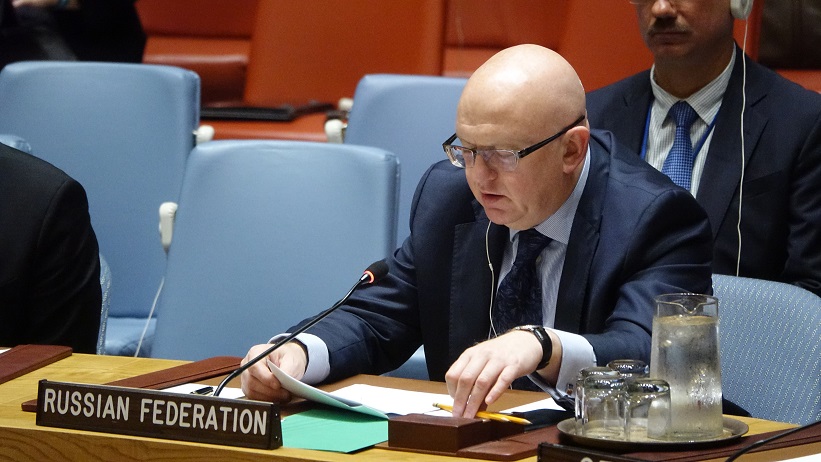Statement by Ambassador Vassily A. Nebenzia, Permanent Representative of the Russian Federation to the United Nations, during the UN Security Council meeting on the implementation of the note by the President of the Security Council
The Security Council’s agenda this month was quite full. I would like to thank you personally, Mr. President, as well as your entire delegation, for the effective and skilful way in which you discharged your duties as President. Your presidency was so good that we did not notice the month’s passing.
We would like to note that the Egyptian initiatives were very topical. I refer in particular to the Security Council meeting on preventing terrorists from acquiring weapons (see S/PV. 8017) and the resolution we adopted to that end (resolution 2370 (2017)). Our discussion of this topic showed yet again that it is necessary to adopt more stringent weapons-control mechanisms, as weapons still manage to fill the arsenals of a number of terrorist organizations almost without hindrance.
The discussion on general issues of sanctions once again allowed us to outline the issues in this area. Despite certain differences of opinion, the majority of members of the Council spoke in favour of further improving our sanctions tools in order to make them more effective and ensure that the humanitarian cost is as low as possible. It is also important that it has been stated very loudly and clearly that unilateral interpretations of sanctions are unacceptable, as is the adoption of supplementary unilateral restrictions.
When it comes to reaffirming that there is no alternative the political settlement of conflicts, the open debate on the role of United Nations peacekeeping operations in undertaking peacebuilding tasks and sustaining peace (see S/PV.8033) was quite useful.
We also saw in August another resolution on the Democratic People’s Republic of Korea (resolution 2371 (2017)), which introduced unprecedented, strict economic restrictions on that country. We are convinced that the possibility of exerting further sanctions pressure on Pyongyang has now been exhausted. We cannot support the idea of economically suffocating North Korea and its people. We need to concentrate on the political track. There is no alternative to the political settlement of all of the issues in the Korean peninsula. This point was reiterated in the presidential statement of 29 August 2017 (S/PRST/2017/16).
Our discussions of Middle East issues showed that the time is more right now than ever to take practical measures to overcome the impasse in the IsraeliPalestinian cluster of issues, which is key to resolving many other issues in the region.
In the Syrian conflict, after de-escalation areas were created, we have noticed positive developments there. In those areas and in other local truce areas, we are witnessing a return to normal life. Demining is being carried out, transport links are being restored, the economic infrastructure is being rebuilt, people are returning to their homes — all of which enables us to concentrate on fighting terrorism. We think that it is important to reinforce those trends, which meet the preconditions necessary for moving forward in the intra-Syrian dialogue in Geneva.
We supported the Egyptian presidency’s proposal to optimize Council meetings on Syrian issues.
We note that there is positive and constructive interaction among all Lebanese political forces, through which the country managed to break out of its prior political stagnation. We think that all of the issues on the country’s national agenda, including those issues related to security, need in future to be addressed in a legal framework through dialogue among all the forces in the country. We support the work being carried out by United Nations Interim Force in Lebanon.
As to the critical situation in Yemen, in particular the humanitarian aspects, additional measures by the United Nations are needed in order to make sure that there is unimpeded humanitarian access to all areas of the country. We need to exert pressure on all sides to the conflict. It is only through an immediate, allencompassing ceasefire without preconditions that a resumption of the political processes will be possible. The resolution of the crisis in Yemen should be found in the political sphere.
Also, in keeping with tradition, we discussed African issues. The meetings on that topic confirmed that African problems should have African solutions. Furthermore, the idea that violating a State’s sovereignty or interfering in its internal affairs is unacceptable remains axiomatic.
In conclusion, I would like to once again thank our Egyptian colleagues and to wish every success to the delegation of Ethiopia, which will take up the gavel in September.
